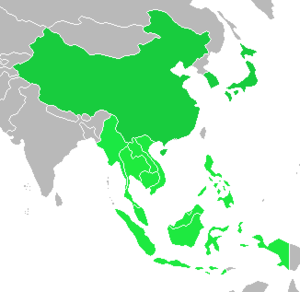
Back Chiang-Mai-Initiative German Initiative de Chiang Mai French Inisiatif Chiang Mai ID チェンマイ・イニシアティブ Japanese 치앙마이 이니셔티브 Korean Inisiatif Chiang Mai Malay Iniciativa de Chiang Mai Portuguese Sáng kiến Chiang Mai Vietnamese

The Chiang Mai Initiative (CMI) is a multilateral currency swap arrangement among the ten members of the Association of Southeast Asian Nations (ASEAN), the People's Republic of China (including Hong Kong), Japan, and South Korea. It draws from a foreign exchange reserves pool worth US$120 billion and was launched on 24 March 2010. That pool has been expanded to $240 billion in 2012.[1]
The initiative began as a series of bilateral swap arrangements after the ASEAN Plus Three countries met on 6 May 2000 in Chiang Mai, Thailand, at an annual meeting of the Asian Development Bank. After 1997 Asian Financial Crisis, member countries started this initiative to manage regional short-term liquidity problems and to avoid relying on the International Monetary Fund.[2]
- ^ "The News International: Latest News Breaking, Pakistan News".
- ^ Stiglitz, Joseph E. (2007). Making Globalization Work. §9, p. 261. ISBN 9780141024967.
© MMXXIII Rich X Search. We shall prevail. All rights reserved. Rich X Search